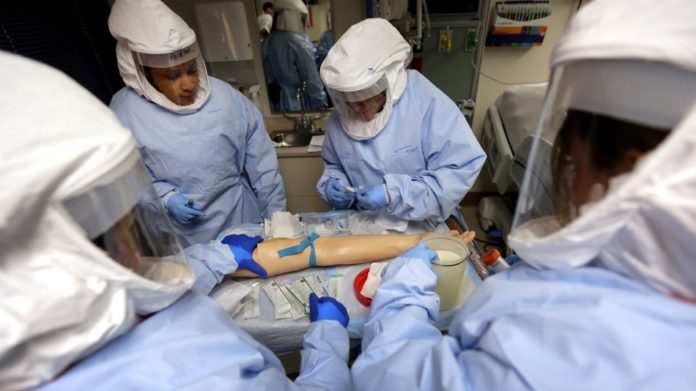Dallas reaches end of Ebola monitoring period

DALLAS — Dallas calmly marked the end of its Ebola crisis on Friday when the last of the 177 people who were being monitored for symptoms of the deadly virus were cleared at midnight.
Thirty-eight days after Thomas Eric Duncan was diagnosed with Ebola in a local hospital, officials expressed relief and resolve that they were prepared if anything similar — with its resulting panic, fear and constant media attention — ever happened again.
“It’s a time to reflect on the sacrifices of our hometown health care heroes and the city, county and school district employees that worked so hard, along with our state and federal partners, to keep us safe during the Ebola crisis,” Dallas County Judge Clay Jenkins said in a statement, calling it an early Thanksgiving for the city.
Monitoring for the last person who came in contact with Duncan, or the two nurses who contracted the virus, ended at midnight Friday. About 50 people who returned to Texas from West African countries where the virus has killed thousands will remain under monitoring.
The White House said U.S. President Barack Obama spoke to state and local officials Friday, and thanked them for their leadership.
Duncan was diagnosed with Ebola on Sept. 30, sending officials scrambling and residents fearing the worst. He died on Oct. 8 at Texas Presbyterian Hospital. Duncan’s fiancee, Louise Troh, and three others were confined to their apartment where Duncan had been staying, before they were moved to private housing.
People panicked over the possible spread of the virus. Jenkins was criticized for entering the apartment to meet with Troh, despite public health experts saying it was safe. Some people refused to shake hands with strangers, and others kept children home from schools where Troh’s children attended.
In the end, no one in the neighborhood was infected. The two people who contracted Ebola were nurses who treated Duncan; Nina Pham and Amber Vinson both have recovered. Vinson was at the hospital Friday, and received a hug from former U.S. President George W. Bush, who visited Presbyterian to show his support for the staff.
Government officials and the hospital have acknowledged missteps in their handling of the crisis, from initially letting Duncan leave the emergency room after his first visit with Ebola-related symptoms, to allowing Vinson to fly commercial to Cleveland and back while she was self-monitoring. Vinson has also said in interviews that she didn’t feel prepared to wear the protective equipment necessary to treat Duncan.
The hospital has mounted a major public-relations campaign to apologize for its mistakes. Officials are also preparing an analysis of how it handled the Duncan case, likely to be published next year.
And while much of the city can breathe a sigh of relief, those closest to Duncan say they’re still angry about his medical treatment and how some have blamed him for bringing Ebola to the United States. With her old apartment torn apart by hazardous materials crews, Troh has had trouble finding a new place to live, as landlords fearful of the virus have refused to rent to her.
Asked about Friday’s milestone, Troh’s thoughts were brief. “Thank God,” she said.
Also on Friday, U.S. officials said Army Gen. Martin Dempsey, the chairman of the Joint Chiefs of Staff, designated five U.S. bases where American troops would be housed and isolated for 21 days upon returning from Africa after serving in the Ebola response mission.
Dempsey signed a plan that lists Fort Hood and Fort Bliss, Texas; Fort Bragg, North Carolina; Joint Base Lewis-McChord, Washington; and Joint Base Langley-Eustis, Virginia, as bases where troops would be quarantined. The U.S. also will use two bases in Italy and Germany for returning troops based in that region.
Military service members are required to undergo 21 days of isolation and monitoring, while U.S. Defense Department civilians can choose to go through the quarantine period or not.
Nearly 5,000 people are dead from Ebola, and more than 13,000 have been infected worldwide, according to the Centers for Disease Control and Prevention. The current outbreak in West Africa is the largest since the disease was discovered in 1976, according to the World Health Organization.
The United Nations released a video on Friday in which a WHO representative explains a new protocol for burying Ebola victims that ensures safety, while still respecting religious rites of the affected countries.
Additional reporting by Mashable
Have something to add to this story? Share it in the comments.
